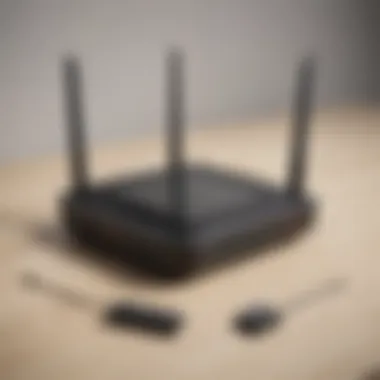Comparing WiFi Router vs Extender: Choosing the Right Networking Solution


Overview of WiFi Router vs Extender
Whilst comparing WiFi routers to extenders, it's vital to discern their primary functionalities and nuances. Routers serve as the core of your network, disseminating signals to various devices. On the other hand, extenders amplify existing signals to reach farther areas. Evaluating their performances and limitations is essential in outfitting your network effectively for seamless connectivity.
WiFi Routers: The Foundation of Your Network
- Introduction: WiFi routers, the linchpin of home networks, receive data from the Internet and transmit it wirelessly to connected devices.
- Key Features and Specifications: Consider bandwidth, range, and the number of bands (dual-band or tri-band) to meet bandwidth demands.
- Pricing and Availability: Research different models and brands to find one that aligns with your budget and tech requirements.
Always prioritize quality over pricing when investing in a router for long-term network stability.
WiFi Extenders: Enhancing Your Signal Reach
- Introducing Extenders: Extenders capture existing WiFi signals; afterward, they retransmit them, extending coverage to peripheral dead zones.
- Enhanced Coverage: Extend your network speed and reliability to the farthest corners of your residence with skillfully placed WiFi extenders.
- Cost Considerations: Understand the value proposition of extenders in extending your existing network versus investing in a more powerful router.
In-Depth Review of WiFi Router and Extender Compatibility
Analyze how WiFi routers and extenders interplay for optimal network functionality. Assess critical aspects like compatibility, setup, and operational synergy between routers and extenders to ensure efficient signal distribution.
How-To Guides for Networking Optimization
- Setting Up: Simplify the configuration process, ensuring maximum efficiency in your network setup
- Customization Tips: Personalize network settings to cater to your specific online activities and bandwidth needs
- Troubleshooting: Anticipate and address potential network issues to maintain uninterrupted connectivity
- Performance Boost: Implement strategies to enhance network speed and stability, optimizing your online experiences
- Wireless Wonderlands: Explore the realm of advanced network solutions, utilizing cutting-edge features and functions.
Tinker with custom settings to surge your network's functional capacity.
Comparing WiFi Routers and Extenders
Examine the contrasts between WiFi routers and extenders to single out the ideal networking solution for you. Delve into intricate specifications, performances, and relative advantages for a well-informed decision-making process.
Prolusion
In the realm of modern networking solutions, the choice between WiFi routers and extenders holds significant weight for individuals seeking optimized connectivity. The selection process often requires a nuanced understanding of the distinctive functionalities, advantages, and limitations inherent in these devices. This article serves as a beacon of knowledge, shedding light on the intricate comparison between WiFi routers and extenders to empower readers with the wisdom necessary for informed decision-making.
As the digital age continues to proliferate, the reliance on robust network infrastructures escalates exponentially. The imperative to discern between WiFi routers and extenders stems from the fundamental need for efficient data transmission and reception in a myriad of settings, spanning from cozy households to bustling office environments. Understanding these devices in their entirety is paramount to unlocking seamless connectivity and ensuring a smooth-sailing user experience.
Engrossed within the intricate web of technological advancements, the significance of comprehending the disparities between WiFi routers and extenders becomes apparent. By dissecting their core functionalities, pros, and cons, individuals can navigate the labyrinth of networking options with clarity and precision, aligning their choices with their unique requirements and aspirations. Harnessing this knowledge equips users with the leverage to optimize their network setups and embrace a future of connectivity where efficiency and reliability reign supreme.
Understanding WiFi Routers


In this section, we dive into the intricate workings of WiFi routers, essential components in the realm of networking technology. Understanding WiFi routers is pivotal for consumers seeking to comprehend their networking needs. These devices serve as the cornerstone for distributing internet connectivity wirelessly to various devices within a designated area. By grasping the nuances of WiFi routers, users can make informed decisions regarding their networking setups and optimizations.
Definition of WiFi Router
A WiFi router is a device that performs the dual function of transmitting data packets between different networks and providing a wireless internet connection to multiple devices. This essential networking tool acts as a gateway, enabling seamless communication between devices within a network and the broader internet. Understanding the specifics of how a WiFi router functions is crucial for leveraging its capabilities efficiently.
Functionalities of WiFi Routers
Providing Wireless Internet Access
WiFi routers excel in offering wireless internet access to devices, eliminating the constraints posed by wired connections. By utilizing radio waves to transmit data, WiFi routers empower users with the flexibility of connectivity across various spaces, facilitating mobility and convenience.
Managing Network Traffic
One of the key functions of a WiFi router is efficiently managing network traffic, ensuring that data packets are transmitted and received promptly within the network. This feature optimizes network performance, preventing congestion and latency issues that could hinder seamless connectivity.
Security Features
WiFi routers come equipped with robust security features to safeguard network integrity and user data. Encryption protocols, firewalls, and access controls are implemented to protect against unauthorized access and cyber threats. Understanding these security measures is vital for maintaining a secure networking environment.
Pros of WiFi Routers
Wide Coverage Area
WiFi routers offer extensive coverage areas, allowing for connectivity across spacious environments such as homes, offices, and public spaces. This wide coverage ensures that users can stay connected seamlessly without connectivity disruptions.
Stable Connection
With WiFi routers, users can experience stable connections that reduce the likelihood of signal fluctuations or drop-offs. This reliability in connection quality is essential for activities that demand consistent internet access, such as video streaming, online gaming, and video conferencing.
Multiple Device Support
WiFi routers support multiple devices concurrently, enabling households or workplaces to connect numerous gadgets to the network without compromising speed or performance. This capability caters to the growing demand for interconnected devices in modern settings.
Cons of WiFi Routers
Limited Range
Despite their overall coverage capacity, WiFi routers are limited in range, which may lead to connectivity issues in areas situated far from the router. Users in remote corners of a space may experience signal weakening or loss, necessitating additional networking solutions for complete coverage.


Signal Interference
WiFi routers are susceptible to signal interference from various electronic devices, such as microwaves, cordless phones, and neighboring networks. This interference can disrupt signal quality and lead to performance inconsistencies, requiring users to mitigate potential sources of disruption.
Difficulty in Coverage Extension
Extending the coverage range of a WiFi router can pose challenges, especially in environments with physical obstructions or signal obstacles. Users may encounter difficulties in expanding network reach to distant corners or multiple floors, compelling them to explore alternative solutions for comprehensive coverage.
Exploring WiFi Extenders
In the realm of networking solutions, the exploration of WiFi extenders holds paramount significance. Understanding the nuances of WiFi extenders is crucial for individuals aiming to enhance their wireless connectivity. This section sheds light on the intricacies of these devices, delving into their functionalities, benefits, and potential drawbacks. By unraveling the core concepts behind WiFi extenders, readers can make informed decisions regarding their networking needs.
Definition of WiFi Extenders
WiFi extenders, also known as WiFi boosters or repeaters, are devices designed to amplify the existing wireless signal from a router. Their primary function revolves around catching the WiFi signal from the main router and rebroadcasting it to extend coverage to areas with poor connectivity.
How WiFi Extenders Work
Signal Amplification
Signal amplification is a fundamental feature of WiFi extenders. By boosting the strength of the incoming signal, these devices enhance the overall reception quality of WiFi networks. This enhancement allows for more extensive coverage and improved connectivity, especially in areas where the main router's signal may be weak or obstructed.
Extension of Network Range
The extension of network range is another key aspect of WiFi extenders. By retransmitting the WiFi signal over a broader area, these devices effectively enlarge the coverage area of the existing network. This extension is particularly advantageous in large homes or offices where dead zones exist, offering a seamless connectivity experience throughout the space.
Advantages of WiFi Extenders
Enhanced Signal Strength
One of the primary advantages of WiFi extenders is their ability to provide enhanced signal strength. By intensifying the WiFi signal, these devices eliminate signal degradation and ensure stable connectivity across various devices within the network. This feature is invaluable for users seeking consistent and reliable wireless performance.
Expanded Coverage Area
The expanded coverage area offered by WiFi extenders is a standout benefit. By spreading the WiFi signal further than the main router's reach, these devices enable users to access the network from distant locations within a building. This expanded coverage ensures seamless connectivity in remote areas where signal strength tends to diminish.
Easy Setup


The user-friendly setup process of WiFi extenders is a key advantage, simplifying the installation and configuration for users. With straightforward instructions and minimal technical requirements, setting up a WiFi extender is a hassle-free task. This ease of setup streamlines the integration of the device into an existing network, making it accessible to users of all technical backgrounds.
Disadvantages of WiFi Extenders
Reduced Bandwidth
Despite their benefits, WiFi extenders come with a trade-off in terms of reduced bandwidth. The process of extending the network signal via an extender can lead to a decrease in overall bandwidth availability. This reduction may impact network speed and performance, particularly in scenarios where multiple devices are connected simultaneously.
Dependency on Router Signal Quality
Another disadvantage of WiFi extenders is their dependency on the quality of the main router's signal. Since extenders rely on the existing WiFi signal to amplify and extend coverage, their effectiveness is directly linked to the source signal's strength and stability. In cases where the main router signal is weak or inconsistent, WiFi extenders may struggle to deliver optimal performance.
Comparison of WiFi Router and Extender
The topic of comparing WiFi routers and extenders is pivotal in shedding light on the best networking solution for different needs. By delineating the characteristics, benefits, and considerations of both devices, users can discern which option aligns with their requirements.
Coverage Area
- WiFi Router: Broad Coverage: The WiFi router excels in providing expansive coverage, catering to large spaces with its robust signal. Its ability to ensure a wide reach makes it a sought-after choice for users looking for seamless connectivity across a vast area. The substantial coverage area of a WiFi router aids in eliminating dead zones and ensuring consistent network access throughout a home or office setting.
- WiFi Extender: Extended Reach: Conversely, WiFi extenders focus on extending the reach of an existing network. By amplifying the signal from the primary router, extenders enhance coverage in areas where the original signal might be weak. This extended reach is advantageous for overcoming distance or structural barriers that could impede the WiFi signal, offering a practical solution for improving network connectivity.
Signal Strength
- WiFi Router: Consistent Signal: A key attribute of WiFi routers is their capacity to maintain a stable and reliable signal strength. This constancy ensures uninterrupted connectivity for users, enabling smooth performance across various online activities. The consistent signal strength of a router is fundamental in supporting seamless browsing, streaming, and gaming experiences.
- WiFi Extender: Boosted Signal: WiFi extenders play a vital role in boosting the signal strength of an existing network. By amplifying the signal transmitted by the router, extenders enhance the overall signal quality, thereby improving connectivity and reducing instances of signal dropouts or lag. The boosted signal capability of extenders contributes significantly to enhancing the user experience by providing a stronger and more reliable connection.
Ease of Use
- WiFi Router: Single Setup: WiFi routers typically offer straightforward setup processes, requiring minimal configuration for users to establish a network connection. The simplicity of a single setup enhances user convenience, making it a popular choice for individuals seeking an effortless networking solution. The uncomplicated nature of setting up a WiFi router streamlines the installation process and facilitates quick access to network capabilities.
- WiFi Extender: Additional Configuration: In contrast, WiFi extenders may necessitate additional configuration steps to optimize their functionality. While extenders are effective in extending network coverage, users may need to adjust settings or position the device strategically to achieve the desired signal enhancement. The additional configuration options available with extenders allow for customized network expansion based on specific requirements.
Bandwidth
- WiFi Router: Full Speed: WiFi routers are renowned for providing high-speed internet access, enabling users to maximize their online activities without experiencing slowdowns or buffering issues. The full-speed bandwidth offered by routers ensures efficient data transmission, supporting bandwidth-intensive tasks like video streaming or large file downloads. The consistent full-speed bandwidth of a router contributes to a seamless and responsive online experience.
- WiFi Extender: Reduced Speed: Despite extending network coverage, WiFi extenders may exhibit reduced speed capabilities compared to the primary router. The trade-off for extended coverage is sometimes a decrease in bandwidth speeds, which can impact the overall network performance, particularly in areas further from the router. While extenders enhance coverage, users should be mindful of potential speed reductions that could affect certain online activities.
Culmination
In this ever-evolving digital landscape, selecting the appropriate networking solution is akin to laying the foundation for seamless connectivity and efficient data transmission. The significance of this conclusion lies in unraveling the complexities surrounding WiFi routers and extenders, offering readers a holistic view of their functionalities, advantages, and drawbacks.
By delving into the intricate details of coverage area, signal strength, ease of use, and bandwidth, readers can draw parallels between the two networking devices and decipher which option aligns best with their requirements. The conclusion acts as the guiding light, illuminating the path towards selecting the right networking gear amidst a sea of options.
Examine your network requirements closely before making a decision
Consider factors like coverage area, signal strength, and ease of setup
Making an informed choice can enhance your network performance
In a realm inundated with technological advancements, grasping the nuances of WiFi routers and extenders is paramount. Empowered with the insights garnered from this article, readers can navigate the nuanced world of networking devices with confidence and clarity.



